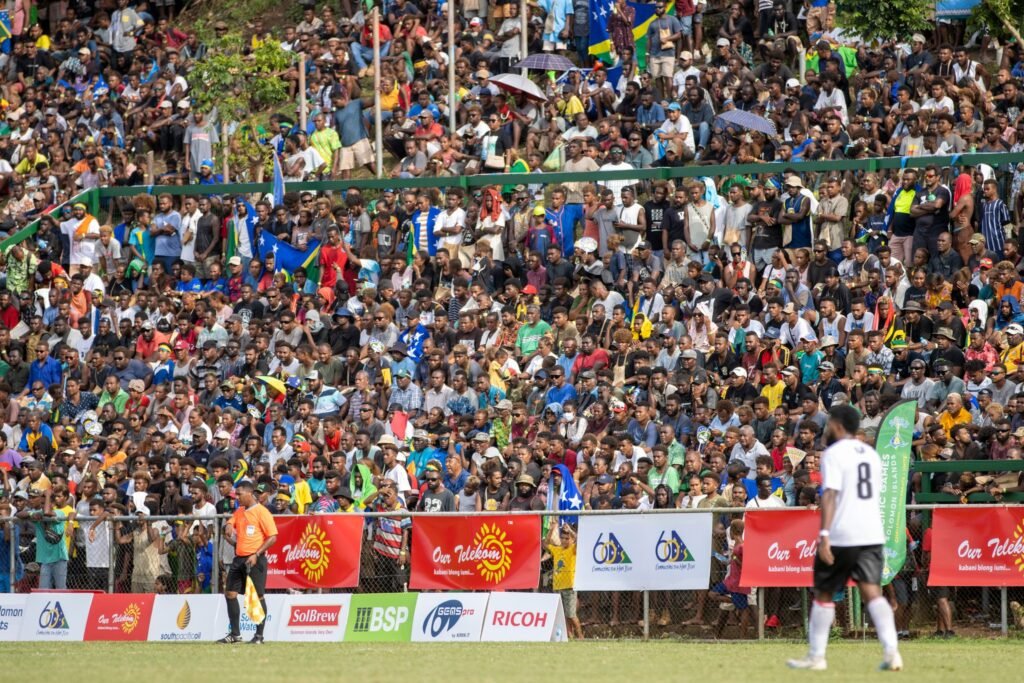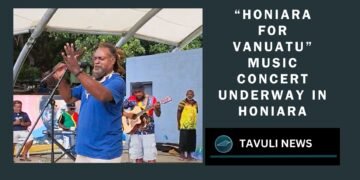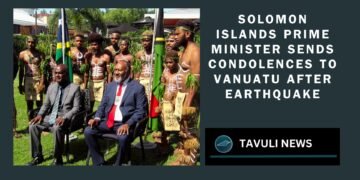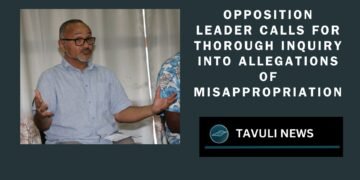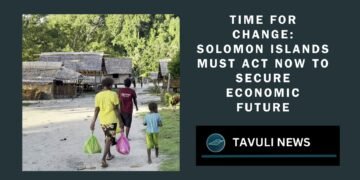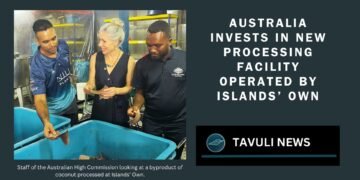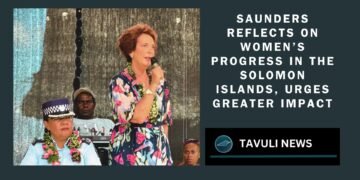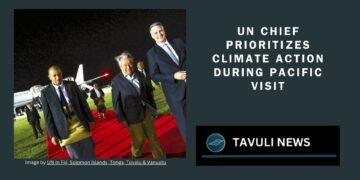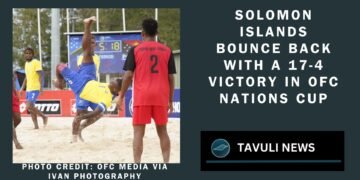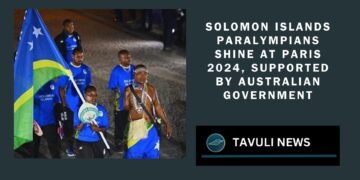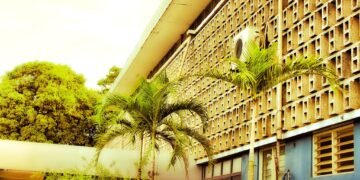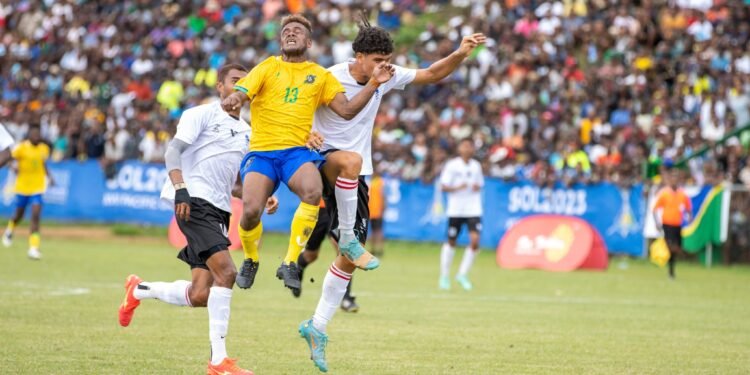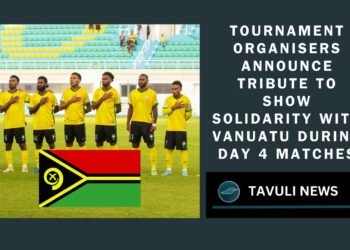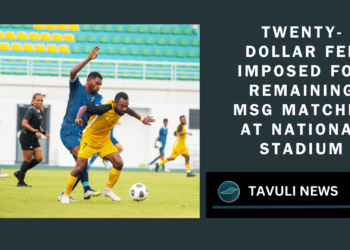A Commentary By Ernest Ta’asi
The Solomon Islands’ passion for football is undeniable.
Across the nation, from the bustling capital Honiara to the remotest villages, football pitches are as central to the community as any infrastructure.
Termed Oceania’s “hottest football bed,” the Solomon Islands’ fervour for the sport surpasses that of its Pacific neighbours. This deep love for football is evident in the country’s history, often highlighted by vibrant emotions and occasional clashes at football events.
In addition to traditional football, the Solomon Islands have been remarkably successful in the five-aside code of the sport, futsal.
The futsal national team, known as Kurukuru, hold the record of winning the OFC Futsal Championship a record six times and have represented Oceania at the Futsal World Cup four times.
This success in futsal, which emphasizes individual skill and agility, is a testament to the unique talents of Solomon Islanders, as they have achieved more in this format than in the 11-aside version of the game.
The national football team, the Bonitos and affectionately dubbed the “Brazilians of the Pacific,” mirrors Brazil’s kit colours and is renowned for their flair and technique.
In the Solomon Islands, football is more than a sport; it’s a national obsession.
The Bonitos’ international success although hasn’t quite matched their domestic enthusiasm.
Their trophy cabinet includes only two major titles from the Melanesian Cup (now the MSG Prime Minister’s Cup), a contest among five Melanesian nations. They won in 1994 and recently in Vanuatu this year. Complementing their modest trophy haul is the Under-20s’ 2008 Wantok Cup win in Honiara, though only Vanuatu attended as Papua New Guinea withdrew.
The dream of playing in the World Cup Finals remains a distant craving for the Bonitos.
During the Russia 2018 World Cup, the Solomon Islands, with just over 700,000 people, topped Google searches for the event, demonstrating their resolute passion for the sport.
The Bonitos have had their moments, though. In the 2004 Oceania World Cup qualification/Oceania Cup, they drew 2-2 with Australia but were defeated in later matches. The 2010 FIFA World Cup qualifiers saw the Bonitos start strong but eventually get eliminated. Hosting the 2012 OFC Nations Cup, they finished fourth despite strong home support.
This year, at the XVII Pacific Games in Honiara, the Bonitos are agonizingly close to winning their first football gold medal. Their 2-0 semi-final victory over Fiji on Tuesday this week has led them to the final against New Caledonia, the most dominant football force in the Pacific Games with seven gold medals.
In their 21 meetings since 1988, New Caledonia has mostly outplayed the Bonitos, winning 14 times. However, a recent 1-0 victory for the Solomon Islands in the 2023 MSG Prime Minister’s Cup Group Stage, offers a sense of hope.
With players like the talented, Europe-based 20-year-old Raphael Lea’i leading the attack, and the inspirational former Auckland City striker Micah Lea’alafa as captain, the Solomon Islands’ current squad has shown promising performances recently.
In the 2022 World Cup Qualifiers in Qatar, the Bonitos delivered an explosive group stage performance, but their hopes were crushed by a 5-0 defeat to New Zealand, led by English Premier League striker Chris Wood.
As the Solomon Islands prepare for Saturday’s final, memories of the 2011 Pacific Games football final loom, where the Bonitos narrowly lost 2-0 to New Caledonia.
This Saturday will be the Solomon Islands’ fourth final at the Pacific Games, following previous defeats to Tahiti in 1995 and Fiji in 1991. New Caledonia has reached the final 10 times.
New Caledonia is set to win another Pacific Games overall title, extending their ridiculous 13 out of 16 titles dominance. They currently lead with 67 gold medals and a total of 150 as of 28th November 2023. Australia, with a scaled-back participation, holds second place with 37 gold medals.
The host nation, Solomon Islands, in 6th place, is performing its best ever in the Pacific Games, with 11 gold medals surpassing their highest of 7 from the 2015 Games in Papua New Guinea.
Before the Games, the country’s Prime Minister Manasseh Sogavare ambitiously aimed for 40 gold medals to celebrate hosting the Pacific Games and the new stadiums. The Solomon Islands’ successful bid in 2016 to host the 2023 Games was a historic moment.
The preparations for the Pacific Games were significantly influenced by a major geopolitical shift.
In 2019, Prime Minister Sogavare made a momentous decision to switch the Solomon Islands’ allegiance from Taiwan to the Republic of China. This strategic shift, unpopular and initially met with skepticism, played a central role in the Pacific Games’ preparations, and has ultimately swayed public opinion.
The promise and subsequent delivery of a state-of-the-art, 10,000-seater stadium by China, valued at SBD$1.8 billion (USD$212.2 million), without any loan obligations, underscored the impact of this geopolitical move.
The construction of this stadium, a gift from China, not only aided the Games’ infrastructure but also symbolically marked the new alliance, casting a spotlight on the geopolitical dynamics at play in the region.
As the XVII Pacific Games reaches its climax after 12 days of intense competition, it’s clear what Solomon Islanders cherish the most.
Football remains the heart of the nation, as evident by the packed Lawson Tama Stadium during the semi-final against Fiji on Tuesday. This Saturday’s final turnout could match or even surpass the record-breaking attendance seen at the Opening Ceremony.
Now that the Solomon Islands is equipped with proper facilities to compete at the Games, there’s an opportunity for a gradual shift in focus to develop other sports.
But for now, the heart of the nation beats for football.
The host nation’s preference is clear for the Games this year: they would rather celebrate a singular football gold than surpass the ambitious target of 40 gold medals.
